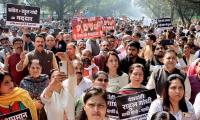This is pure sensationalism not even remotely based on facts or records.' So says Congress party spokesperson Abhishek Singhvi when asked to react to the sensational disclosures in The Mitrokhin Archives II: The KGB and the World.
Allegations in Mitrokhin Archives vague: Congress
Singhvi went on to make a couple of curiously contradictory remarks. He began by describing the papers Mitrokhin brought with to the West as 'stolen'; Singhvi then said that they had 'no truth at all.' It is axiomatic that thieves loot things that are of some value; given that Mitrokhin ranked high in the KGB hierarchy, his documents must have fit that description.
Mitrokhin -- or his literary executors at any rate -- were content to write about outright bribery, on the lines of 'You take our money, we call the shots!' But was there another, more insidious, form of gathering influence taking part at the same time? Something that was not bribery per se, but ended up with the same results, namely getting India to dance to Soviet piping?
Everyone knows about the manner in which India and the old Soviet Union took care to maintain defence and foreign policy links. Hefty chunks of our defence budget were spent on buying Soviet armaments. But there was also active trading in other, non-military goods.
The Soviet Union was always on the hunt for food, not hesitating to buy even from its ideological rivals in the United States. Moscow was obviously only too happy to buy from its Indian friends when the Green Revolution began to produce the first modest surpluses. (Why and how Russia -- a food-exporting nation under the Tsars -- was reduced to a state wherein it could not feed itself is a saga in itself.)
At any rate, cutting a deal in Delhi meant the involvement of the one indispensable figure -- the middleman. The Soviets came to India with a large shopping list -- spices from Kerala, coffee from Karnataka, tobacco from Andhra Pradesh, tea from Assam, hosiery from Punjab, grain from practically everywhere. But they had an invariable condition; slightly peculiarly given their anti-capitalist rhetoric, the Soviets insisted on dealing through the private sector.
Why did they do so? Was it a commentary, even in that heyday of socialism, that the private sector was simply more efficient even then? Or was it because the Soviet Union wanted to ensure that money reached the right hands?
If the rumours are true, there were some astonishing names that popped up when, say, rice was being sold to the Soviet Union.
'Brokerage' through 'legal exports' would have been a wonderful way to finance individuals or organisations, thoroughly legal and thoroughly profitable! (India was scarcely the only nation that might have been swayed beyond the limits of prudence by Soviet trade. Long before OPEC learned the fine art of delivering 'oil shocks,' the USSR was using its immense reserve to buy friends. Or do you think it is just coincidence that Fidel Castro's rhetoric became increasingly radical as Soviet oil prices decreased?)
I have no idea if the Soviet Union gained any military advantage or rare political insight through this trade with India. However, what everyone knew is that India was getting a raw deal thanks to some questionable decisions. For instance, the rouble was kept at an artificially high level that had no relation to reality. This meant that Indian goods were terribly underpriced when they were delivered to the Soviet Union.
The good Comrades took advantage of this to earn hard currency -- US dollars, German marks, Swiss francs, and the like; they sold Indian tea, for instance, at the actual market rate. We were getting worthless roubles while they were getting the dollars we should have earned, in effect India was subsidising the Soviet Union!
Trade was not the only instrument used 'to win friends and influence people.' At one point, the Soviet educational system was held up as a model to the world (even if it never quite had the reputation of a Harvard, a Stanford, or an Oxford). Our Soviet comrades were quite capable of offering college scholarships to study, say medicine, in institutions from Moscow to Sofia. The parents of these lucky students would have been sufficiently grateful.
Abhishek Singhvi pointed out that Mitrokhin Archives allegations are unproven until Moscow releases all its archives. We cannot ask the Russian government to please us. But there is an easier option: we can check our own archives. How many wards of Left-leaning leaders entered Soviet colleges? Who were the people involved in bartering Indian goods for less than their proper value? Will the Government of India enlighten us?








